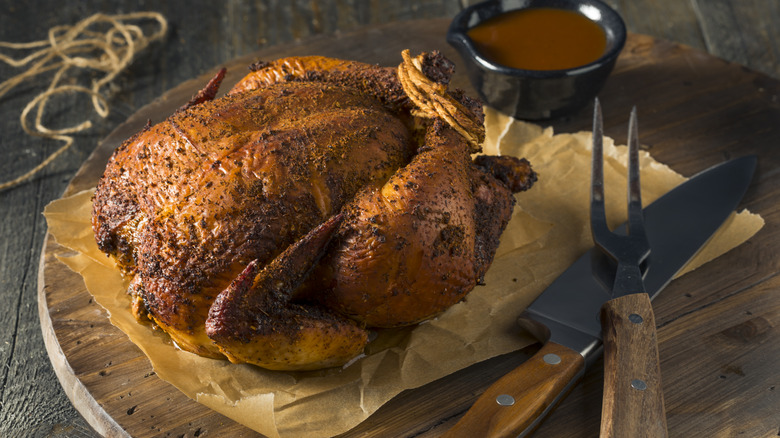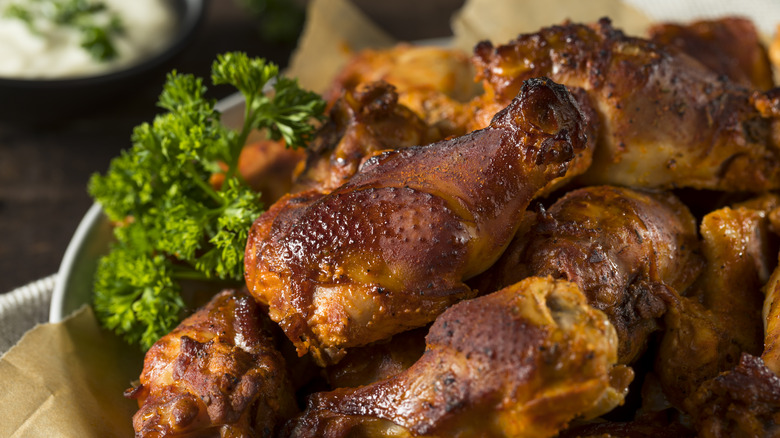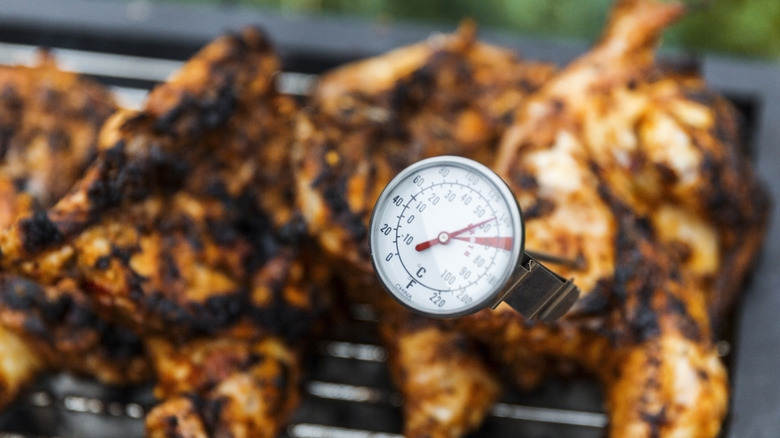The Biggest Mistakes People Make When Smoking Chicken, According To An Expert
Smoking chicken can be surprisingly tough to master for any home cook, even those with barbecuing experience. There are countless mistakes that could make the difference between a delectably juicy meal and a burnt-tasting, tough piece of poultry. To help you avoid the most common pitfalls, Food Republic spoke with Adam Truhler and Matt Mulligan from The Grilling Dad, who are experts at anything barbecue-related. First off, the two dads noted that one of the biggest mishaps is running the smoker at too low of a temperature.
Because lower temperatures will result in your poultry taking much longer to cook, Truhler and Mulligan said that you "risk creating a tough, dry exterior because of air flow and evaporation". Chicken breasts are particularly prone to this problem, as they are notoriously lean and easily lose their moisture by overcooking. Our experts also noted that pellet smokers with a built-in fan are also more likely to create leathery poultry, as they distribute heat more evenly. This might be a good thing for a big hunk of brisket, but it can overcook chicken fast. Plus, you don't want to cook too cold and make the crucial mistake of undercooking chicken, as we all know that this can lead to a nasty bout of food poisoning.
The experts agree: Don't over-smoke your chicken
According to Adam Truhler and Matt Mulligan, another prevalent issue lies in over-smoking your chicken. When left cooking for too long, the fumes from the wood or charcoal can actually infuse some nasty, burnt flavors that will make your food taste scorched. While this issue is less prevalent when using pellets, the experts added that "the hotter the smoker temperature, the more complete the combustion and thus relatively less smoke is produced." Therefore, the Grilling Dads recommend keeping your appliance's temperature between 275 and 325 degrees Fahrenheit.
Traditional wood smokers are more tricky to work with, as they tend to release more exhaust than their pellet counterparts. For these smokers, Truhler and Mulligan suggest going slow and using less fuel than you would with beef or pork, as chicken soaks up the smoky taste more readily. "Err on the side of caution and add more wood on subsequent cooks until you figure out the perfect level of smokiness," they said.
Since heavy smoke can overpower the taste of poultry, select mild-flavored wood chips over bolder variants like mesquite. Apple and maple kiln are popular options, but you can use hickory or oak if you want something a little bolder. These rules still apply if you're using an electric smoker to cook meat, so select your fuel carefully.
How to avoid overcooking chicken in the smoker
While you always want to exercise patience when smoking any cut of meat, you can probably guess that chicken dries out pretty quickly if left on the smoker for too long, and it's better to rely on temperature than time. The Grilling Dads recommend investing in an instant-read food thermometer, as they allow you to measure exactly when your food is ready to come off the heat. If you're in need of recommendations, professional chef Alton Brown trusts the high-tech Thermapen food thermometers the most.
While the U.S. Department of Agriculture recommends cooking all poultry products to at least 165 degrees Fahrenheit, Adam Truhler and Matt Mulligan actually advise to take out chicken a little earlier. Once poultry hits 160 degrees, it only takes a few seconds of holding it at that temp before harmful pathogens like salmonella are neutralized, so as long as you monitor the meat, there's no need to worry about getting it up to 165 degrees exactly. Plus, you have to account for carryover cooking, which will continue to raise the temperature of your meat by a few degrees after it comes off the smoker.
Lastly, try to stick to thicker cuts of chicken, or closely monitor thinner parts. Thin areas on breasts and cutlets inevitably cook faster and have a higher chance of turning leathery in the smoker. Lastly, our experts caution to not season the chicken too heavily, since its taste is so mild.



